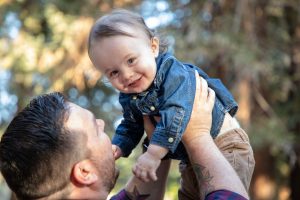 Published in PEPTalk Winter 2022 edition
Published in PEPTalk Winter 2022 edition
Dear A.C.D. Tas members and supporters, my name is Nick, and do I have a story to tell you!
I’m a single dad to my son Tim who is 11, and I think it’s fair to say that we have been through a lot together. It’s a bit different when you raise a child with disability as a dad on your own, and I really wanted to get my story out there so other dads (whether they are single dads or not) could have a read, and also so the wider community could get a bit of insight into the particular challenges that come up for dads when they’re doing the parenting.
My boy has A.S.D. (Autism Spectrum Disorder), A.D.H.D. (Attention Deficit Hyperactivity Disorder) and global developmental delay, and displays challenging behaviours at times. It’s been a struggle with the school, getting him there for more than a few hours a week. It seems he’s too difficult for them. He’s been known to use some fairly colourful language (and no, I didn’t teach it to him!) and when he gets anxious or overwhelmed he can take things out on objects and smash things up. Usually not his own stuff either. But he and I have a strong bond, and the main challenge for me right now is getting some respite so I can keep going. Honestly, sometimes I think I’d trade all the supports we have in place for just one ‘Rent-a-Nanna.’
But let me give you a bit of background about our family.
I’m from Melbourne originally and grew up there. After school I went on to university and got my Bachelor of Science, my work background is in geology. I first came to Tasmania for work as an environmental scientist and loved it, so I bought a block of land down here. It was then I met my ex-wife, Jackie and we began, in hindsight, what was a pretty unstable relationship. Jackie had some mental health issues which she told me about early on and I remember thinking, because I knew very little about mental illness, that if I was just nice to her then everything would be alright. Of course, it’s way more complex than that. We were on and off for a few years, I felt like I was trapped in a cycle; Jackie would be OK for a while and then her health would deteriorate, and she’d be threatening self-harm. It was worrying and we were living on a roller-coaster of emotions.
I went away to work for a while and when I came back to Tassie we got back together. Things were continuing to be quite unpredictable between us, but it was around this time that we found out, what we thought may be a reason for Jackie being unwell, that she had a serious brain problem and would need to go to the mainland for surgery. It was a risky thing, but we went to Sydney so that Jackie could have it done. Unfortunately, although the operation went well, Jackie suffered a stroke during the procedure and this resulted in some frontal lobe damage to her brain. At first, we noticed her speech wasn’t as it used to be, she had trouble thinking of the right word for things, but as time went on, there were changes to her personality. Frontal lobe damage can cause this type of change, and it can also make it difficult for people to control their emotions, make decisions and organize their lives. Added to that, Jackie’s underlying mental health condition made it difficult for her to be alone, and she’d swing from being nice to me one minute and claiming I was cruel to her the next. She struggled with managing her day-to-day life, including things like banking and finances, and experienced mood swings with displays sometimes of angry and aggressive behaviour.
It was hard for me to absorb. I’d been weighing up my options, feeling like I was in an abusive relationship, treading on eggshells when I was with her and not sure I really wanted to continue in the relationship. But now that she’d had the operation and the stroke, I believed that I couldn’t abandon her in her hour of need. I thought, ‘this is it, my life is over’ and resigned myself to doing whatever it took to care for her.
When we got back to Tasmania, we tried to live as normal a life as possible, we bought a house and decided to try for a child. I hoped this would settle things down a bit and bring us together as a family. My son was born in 2011, but it was soon clear that Jackie was not able to take care of him. In fact, when she was still in hospital after the birth, a nurse took me aside and made me promise I’d never leave our baby alone with his mother. At home, things didn’t improve. Jackie didn’t take to motherhood; she wasn’t able to take responsibility for Tim and seemed to resent him for taking my attention away from her. I did everything to parent him, including all the night feeds and nappy changes as well as all the work to keep the house and our family in it going. I kept caring for my Jackie as well, which was constant. More than once I called for emergency help to take her to hospital during episodes of psychosis.
When my boy was 2 and a half, a direct support provider became involved in Jackie’s life, supporting her on outings in the community. This was good for Jackie and took some of the caring pressure off me. It should have been a useful thing for our family, but it turned out that I was being painted as a villain to the support staff, and to the extent that one day the police arrived at our house. They told me I had five minutes to pack a bag and leave, that I was to leave my son behind and get out. I explained that I couldn’t leave my child with his mother, and the reasons why. This was a terrible experience and it all came to a head ending in Jackie and I splitting up, her moving out and me becoming a single parent.
Jackie has her own N.D.I.S. plan and support around her now, but even living apart and separated, she still relies on me for many things in her life. Sadly, she also has changeable moods and still gets very angry and projects this at me. During these times I’m frustrated because I want to help but it is made really difficult because she and I can’t communicate about what is happening and her support organisations don’t have consent to talk to me. Added to my caring responsibilities recently, Jackie’s mum has become unwell and I’ve been doing some things she isn’t able to do, to help. The carer load I am carrying is a lot and I feel the weight of it.
But getting back to my son, as a baby he wasn’t hitting his milestones, and at nine months he was not even sitting up. I was not only a first-time parent, but I also had no network, no friends or relatives in Tasmania that I could turn to, or who could advise me. By age three he was attending childcare, which provided a bit of respite for me, and then staff identified something was wrong. At first the paediatricians at the hospital who saw him didn’t think he had Autism Spectrum Disorder. But the childcare staff were pretty convinced he was on the spectrum. They urged me to get a second opinion, so I could get supports in place early. Finally, he had an assessment through St Giles and was diagnosed with Autism Spectrum Disorder, attention Attention-deficit/hyperactivity disorder and global developmental delay.
Caring for my son has been a big learning curve for me. For a start, I had to learn to do all the things a mother and a father would normally do, by myself. I’d often be out and about with him, maybe giving him his bottle or spooning baby food into him, and people would come up to me and say, ‘aren’t you good with your baby?’ I often wondered if they’d say the same thing to a woman feeding her child in public. I mean, it’s not as if I’m not going to feed my child! Still, I guess it’s not as common seeing a dad doing everything.
I went along to playgroup and although I was the only man, I got on well with the other parents. But I had no informal support and often felt really isolated. I still do in many ways. Women seem to gather in groups and be able to support each other, whereas it is different for men and for dads, especially those who have children who have disability. I often felt judged on my parenting, and that my son’s challenging behaviour was attributed to poor parenting on my part. I’d get comments that I was too harsh and strict, or that I was too lenient. Very rarely that I was doing a good job in a tough situation!
We’ve tried all sorts of therapies and techniques over the years. I have to say, learning Positive Behaviour Support (P.B.S.) from our occupational therapist was great for me as a parent. When your child has complex challenging behaviours it’s often hard to know what to do and regularly, we were just muddling through as best we could. I remember attending a support group where a parent peer from A.C.D. Tas was the presenter and I pulled her aside to ask her advice on how to get my child to eat, as he seemed to gravitate to crunchy foods only and I could only get him to eat one or two things. Her response was ‘don’t beat yourself up over it. Just do what you can do.’ She said that crunchy food stuff was probably a sensory-related driver and that her son used crunchy food as a calming technique, like Nutrigrain, and that at one time he had been drawn to eating the dog’s dry food. This was such a relief for me because it just so happened that at that time (much to my shame), I was struggling to stop my boy eating our dog’s dry dog food. Not to beat myself up about my parenting was possibly the single most practical piece of parenting advice I ever got.
 Some challenges nothing can prepare you for. One of the hardest things is watching your child struggling at school; the other kids just don’t get him and the teachers find him a handful. I reckon it’s the most heartbreaking thing to be the parent of a friendless child. We are struggling to get my boy attending school more than a couple of hours a day for two days a week, but things are gradually improving, and we are working with the school with help from A.C.D. Tas Coordination of Support and Advocacy.
Some challenges nothing can prepare you for. One of the hardest things is watching your child struggling at school; the other kids just don’t get him and the teachers find him a handful. I reckon it’s the most heartbreaking thing to be the parent of a friendless child. We are struggling to get my boy attending school more than a couple of hours a day for two days a week, but things are gradually improving, and we are working with the school with help from A.C.D. Tas Coordination of Support and Advocacy.
The school say he’s ‘too much for them,’ but I think because they take quite an authoritarian approach at times that it just won’t work with my child. Getting positive behaviour support in place and everyone on the same page is our goal right now.
It’s pretty exhausting when you are full time parenting most of the week though. My life certainly hasn’t been easy. I’ve had a very varied work history and have worked in some of the ‘blokiest of bloke’ jobs possible, but being ‘a mother’ to a baby is the toughest, most demanding and taxing job I’ve ever done! But it was also (by orders of magnitude) the most rewarding. And if more men were actually able to experience what it takes to nurture a child and how much work it is, perhaps they’d be stronger advocates for peace, and more motivated to keep their children from fighting senseless wars and safe from harm.
Here are some of my parenting reflections from my experience:
- It was (for the pre-school years at least) the only time since my childhood, that I was able to ‘live in the NOW.’ It didn’t matter what month of the year, day of the week, or even what time of the day it was, all that mattered was my baby’s needs got met, when they needed to be met.
- I’m also a far more empathetic person now. The feeling has faded a bit now, but when I was still flooded with (new baby) endorphins and holding my baby, if I saw a news report or something about something awful happening to a child, it felt as though a knife was literally plunged into my heart. I’m sure parents reading this know that feeling!
- Raising my son has put things in perspective for me. To give you an example, I was sitting outside a while ago, not paying attention to my boy, and he doesn’t like it when you don’t pay attention to him. So, he grabbed a garden spade and came up behind me with it. I could see him reflected in the glass door and he swung at me but then I could see his better judgment kicking in and he swung wide and missed me. It sounds strange I know, but that was a big win in my books.
Where do I see us in 10 years’ time? Well, I’d like to be supporting my son in being some sort of online ‘Youtuber’ or videographer, that helps inspire other ‘differently abled’ people, by showing them they’re not alone. He is pretty technically minded and likes this kind of thing, why not help him make it into a career?
For myself, I hope to be using my experiences to help mentor other young parents (especially single fathers / male primary carers of children with high needs) to overcome those, ‘Am I doing this right? Is my parenting the problem?’ types of thoughts. It would have helped me to have had a network of guys in a similar situation to talk about these things with, so maybe in the future, it’s something I’ll be able to instigate for other dads.
Thanks to the family who generously shared their story with us. They have chosen to remain anonymous. As a result, some names have been changed to protect their privacy.
Are you a man with caring responsibilities?
There are a few men’s groups in Tasmania you might like to connect with:
Men Care Too
MCT aim to increase awareness and recognition of men in unpaid or informal caring roles. They run social events in Ulverstone, Railton and Burnie areas.
www.mencaretoo.org
Men’s Table (MT1)
They began with twelve men who have met once a month for dinner. Now they run Men’s Table dinners Australia-wide, helping men build meaningful male friendships and overcoming the stigma that “men don’t talk.”.
www.themenstable.org
Men’s Sheds
These are great places to meet other men, share stories over a cuppa, or pass on or learn new skills. There are Sheds all over Tasmania, and are described as ‘the perfect place to offload your worries in a place where you feel comfortable.’
www.tasmanianmenssheds.org.au
